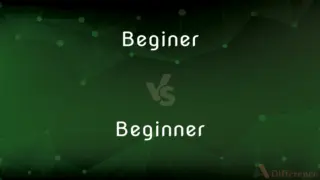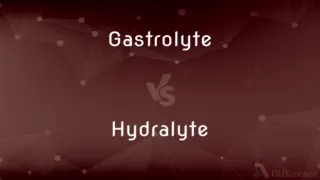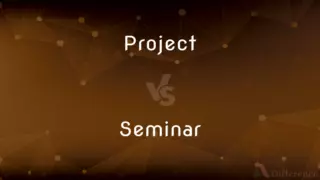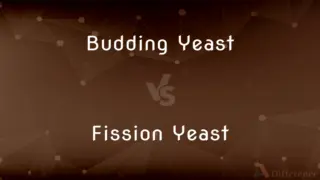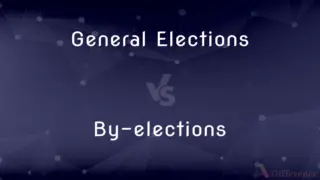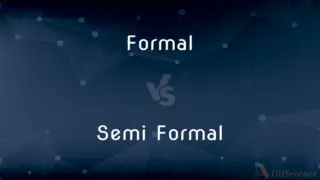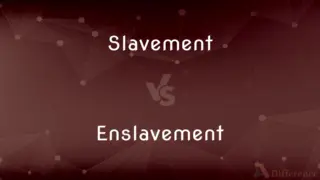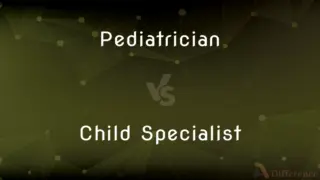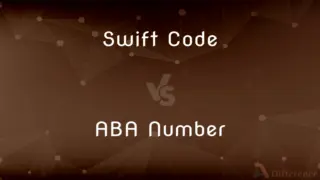Direct Speech vs. Indirect Speech — What's the Difference?
By Tayyaba Rehman & Fiza Rafique — Published on October 8, 2023
Direct Speech: quotes exact words spoken. Indirect Speech: reports the essence of what was said without quoting.
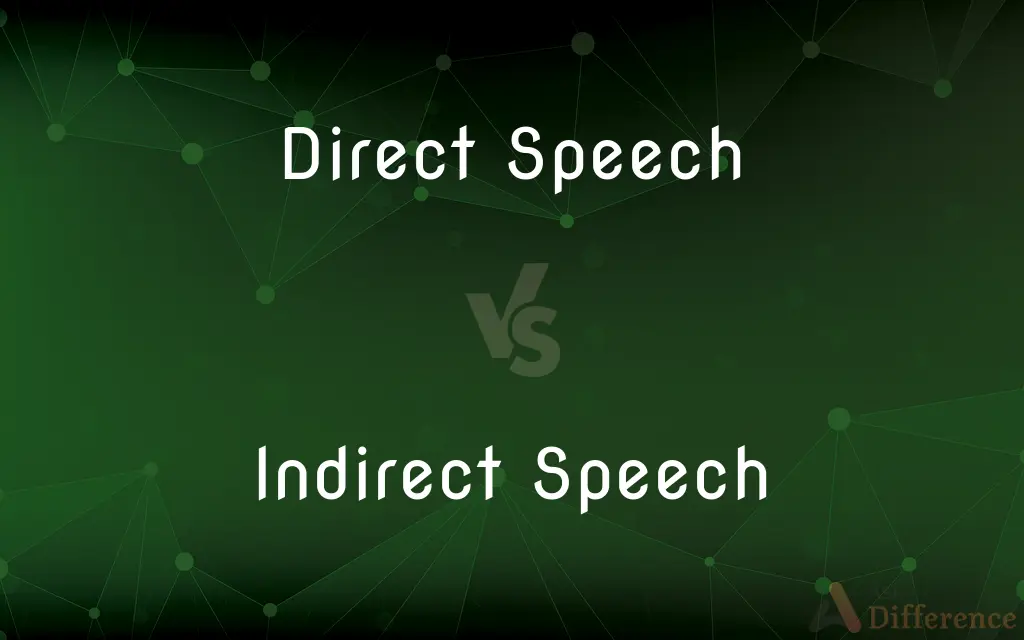
Difference Between Direct Speech and Indirect Speech
Table of Contents
ADVERTISEMENT
Key Differences
Direct Speech often feels immediate and can bring a narrative to life by allowing readers or listeners to hear the characters' voices. "The boy shouted, 'I found the treasure!'" places us in the moment with the boy. Indirect Speech might say, "The boy shouted that he had found the treasure."
Tayyaba Rehman
Oct 08, 2023
Direct Speech and Indirect Speech both offer ways to convey information or relay dialogue. While Direct Speech gives a first-hand account, "She whispered, 'I trust you.'" Indirect Speech provides a summary, "She whispered that she trusted him."
Tayyaba Rehman
Oct 08, 2023
In Direct Speech, quotation marks are essential because they highlight the exact wording of the original speaker. "He exclaimed, 'What a wonderful surprise!'" showcases the emotion and words of the speaker precisely. Indirect Speech would present this as, "He exclaimed that it was a wonderful surprise."
Tayyaba Rehman
Oct 08, 2023
Direct Speech is a form of quoting where you relay the exact words uttered by a speaker. For instance, "She said, 'I love chocolate.'" Here, we see the speaker's precise words in quotes. Indirect Speech, on the other hand, conveys the idea of what someone said but does not use their exact words. An example might be, "She said that she loved chocolate."
Tayyaba Rehman
Oct 08, 2023
Understanding Direct Speech requires the reader to engage with the words of the original speaker as they were spoken. "The teacher instructed, 'Please open your books to page 25.'" shows the direct command from the teacher. Indirect Speech provides the essence, "The teacher instructed the students to open their books to page 25."
Tayyaba Rehman
Oct 08, 2023
ADVERTISEMENT
Comparison Chart
Words like “say” or “tell”
Come before the quote.
Usually followed by “that” (not always).
Tayyaba Rehman
Oct 08, 2023
ADVERTISEMENT
Definitions
Direct Speech
Direct Speech: verbatim reproduction of verbal communication.
Leave the room, he ordered.
Tayyaba Rehman
Oct 02, 2023
Indirect Speech
Indirect Speech: a grammatical construction that summarizes verbal exchanges.
The teacher instructed them to complete the assignment.
Tayyaba Rehman
Oct 02, 2023
Direct Speech
Direct Speech: representation of the exact words spoken by a person.
She said, I'm coming.
Tayyaba Rehman
Oct 02, 2023
Indirect Speech
Indirect Speech: a summary or interpretation of someone's spoken words.
She mentioned that it might rain later.
Tayyaba Rehman
Oct 02, 2023
Direct Speech
Direct Speech: an expression of direct dialogue in text.
He asked, Are you okay?
Tayyaba Rehman
Oct 02, 2023
Indirect Speech
Indirect Speech: reporting spoken content without citing it verbatim.
They claimed they had done their best.
Tayyaba Rehman
Oct 02, 2023
Direct Speech
Direct Speech: a style in writing where spoken words are enclosed in quotation marks.
It's raining, she observed.
Tayyaba Rehman
Oct 02, 2023
Indirect Speech
Indirect Speech: relaying what someone said without quoting their exact words.
He said he was tired.
Tayyaba Rehman
Oct 02, 2023
Direct Speech
Direct Speech: capturing word-for-word utterances in writing.
We won! they cheered.
Tayyaba Rehman
Oct 02, 2023
Indirect Speech
Indirect Speech: conveying the essence of spoken words without direct quotations.
He revealed that they were moving.
Tayyaba Rehman
Oct 02, 2023
FAQs
What's the main difference between Direct Speech and Indirect Speech?
Direct Speech quotes exact words, while Indirect Speech summarizes or paraphrases them.
Tayyaba Rehman
Oct 08, 2023
Can pronouns change in Indirect Speech?
Yes, pronouns can change based on the speaker and context in Indirect Speech.
Tayyaba Rehman
Oct 08, 2023
How does tense usually change in Indirect Speech?
Indirect Speech often shifts the tense from present to past.
Tayyaba Rehman
Oct 08, 2023
Do I always need quotation marks for Direct Speech?
Yes, quotation marks are used to signify the exact words spoken in Direct Speech.
Tayyaba Rehman
Oct 08, 2023
Does Indirect Speech use the word "that" after verbs like "said"?
Often, but not always. It can depend on the fluidity of the sentence.
Tayyaba Rehman
Oct 08, 2023
Why might a writer choose Indirect Speech over Direct Speech?
Indirect Speech can be more concise, avoid repetition, or suit the narrative's flow better.
Tayyaba Rehman
Oct 08, 2023
Can both Direct Speech and Indirect Speech be used in the same narrative?
Absolutely. Writers often mix both forms to balance immediacy with exposition.
Tayyaba Rehman
Oct 08, 2023
Do I need to change the verb form in Indirect Speech?
Often, especially if the main verb is in the past tense. For example, "He says" might become "He said."
Tayyaba Rehman
Oct 08, 2023
When should I use Direct Speech in writing?
Use Direct Speech when it's essential to convey the exact words spoken, often for emotional impact or clarity.
Tayyaba Rehman
Oct 08, 2023
Is Direct Speech always in the present tense?
No, but it often retains the tense used by the original speaker.
Tayyaba Rehman
Oct 08, 2023
Is there a change in modals when using Indirect Speech?
Sometimes. For instance, "can" might become "could" in Indirect Speech.
Tayyaba Rehman
Oct 08, 2023
What's the benefit of using Direct Speech in narratives?
Direct Speech can make dialogue feel authentic, immediate, and engaging for the reader.
Tayyaba Rehman
Oct 08, 2023
Is Direct Speech more emotional than Indirect Speech?
Direct Speech can feel more immediate, capturing the speaker's emotions and voice directly.
Tayyaba Rehman
Oct 08, 2023
How does Indirect Speech handle questions?
Indirect Speech can turn direct questions into statements or indirect questions. For instance, "Where are you?" becomes "He asked where I was."
Tayyaba Rehman
Oct 08, 2023
Which is more objective: Direct Speech or Indirect Speech?
Indirect Speech can seem more objective since it removes the exact phrasing, but both can be used objectively or subjectively, depending on context.
Tayyaba Rehman
Oct 08, 2023
Author Spotlight

Written by
Tayyaba RehmanTayyaba Rehman is a distinguished writer, currently serving as a primary contributor to askdifference.com. As a researcher in semantics and etymology, Tayyaba's passion for the complexity of languages and their distinctions has found a perfect home on the platform. Tayyaba delves into the intricacies of language, distinguishing between commonly confused words and phrases, thereby providing clarity for readers worldwide.

Co-written by
Fiza RafiqueFiza Rafique is a skilled content editor at AskDifference.com, where she meticulously refines and enhances written pieces. Drawing from her vast editorial expertise, Fiza ensures clarity, accuracy, and precision in every article. Passionate about language, she continually seeks to elevate the quality of content for readers worldwide.

